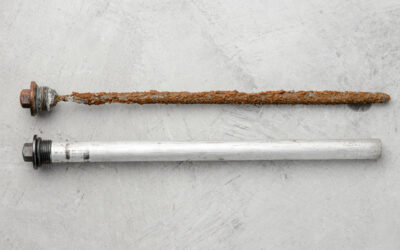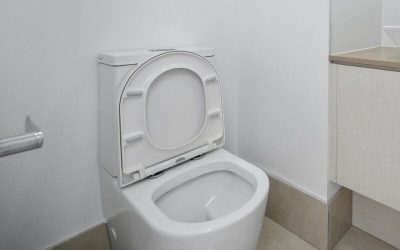Our water smells like sulfur in one faucet. Does anyone know why this might be the case? This question is quite common.
I don’t know about you, but there is a time I turned on the faucet in my shower and the water had a weird smell like that of rotten eggs.
Since I knew I didn’t have any rotten eggs inside my faucet, I embarked on a fact-finding mission. Turns out the awful smell was due to too much sulfur in the water. But how did that happen?
In this post, I’m going to tell you more about what causes sulfur-smelling water and how I fixed it. If you are curious about this, keep reading.
Causes of sulfur smell in the water
One of the most common causes of sulfur smells in water is bacteria.
When water contains high levels of naturally occurring sulfates, bacteria can thrive and produce hydrogen sulfide gas. This gas gives water a characteristic rotten egg smell.
Other causes of sulfur smells in water include decaying organic matter, such as leaves and algae, and chemical contaminants, such as sulfites or mercury.
If you suspect that your water has a sulfur smell due to any of these reasons, contact your local water utility or a certified professional to have it tested.
Reasons your water smells like sulfur in one faucet
Based on the above causes of sulfur smell in water, there are a few different reasons why your faucet might smell like rotten eggs.
1. Bacteria growing in the hot water tank or heater
A major possibility is that there’s something wrong with your water heater, and it’s releasing sulfur dioxide gas.
This could be due to bacteria growing in your hot water tank or heater and causing a sulfur smell to come out of your faucet.
It could be caused by a number of things, such as improperly maintained water heaters, inadequate water flow, or an excess of minerals in the water.
Another possible cause is sacrificial anode rod corrosion due to the presence of anaerobic bacteria in the water. The anode rod in a water heater protects the tank from corrosion by sacrificing itself to corrode instead.
However, when the anode rod corrodes, the metals in it can react with sulfates in the water and release hydrogen sulfide gas (H2S), which is the source of the unpleasant smell.
See also: How to tell when anode rod is bad
2. Corrosion in the plumbing system or pipes
If you’re noticing a foul smell coming from your faucet, it could be due to corrosion in the pipes.
Over time, minerals in the water can build up on the pipe walls and create a thin film. This film breaks down easily and becomes brittle, which causes it to flake off and leave behind corroded pipes.
As water flows through the corroded pipes, iron is released into the water, which causes that characteristic rotten egg smell.
3. Chemicals leaching into the water system upstream
Upstream contamination is a big problem when it comes to water quality.
Chemicals can leach into the water system and cause all sorts of problems, including sulfur contamination.
This can make the water taste and smell bad.
Do your neighbors have the same problem? If so, then it could be an issue with the municipal water and you should report it immediately.
4. Algae growth in the well water
Another possible cause could be algae growth in the well water.
Algae in your well water can cause a sulfur smell in your faucet for a few reasons. First, as the algae decompose, it releases sulfur compounds into the water.
Second, the water itself may be high in sulfates, which can interact with the algae to create that same sulfur smell.
Third, if your well is aerated, that oxygen can also interact with the sulfates to create that distinctive odor.
Also, if you live in an area with natural hot springs, the odor could be from hydrogen sulfide gas seeping into the well from underground.
See also: How to remove water spots from brushed nickel faucets
Why does only one faucet smell like rotten eggs?
In order to know what is causing the unpleasant sulfur smell, you need to determine which faucet is bringing up the smell. Is it the cold water faucet or the hot water faucet?
- Cold water only: Coldwater faucets may smell like sulfur due to the presence of sulfate-reducing bacteria in your water supply. This can be from water sources such as from the well or upstream water contamination. Corroded water pipes may also cause this problem due to the high iron concentration in the water.
- Hot water only: If the hot water faucet is emitting the rotten egg smell, it could be due to the presence of hydrogen sulfide gas in your water heater. This could be due to some of the reasons we explained earlier such as anode rod corrosion, excess minerals, and inadequate water flow in the water heater.
How to get rid of sulfur or rotten egg smell from water
There are a few different ways to solve this problem. For instance, you can start by disinfecting your hot water tank with a solution of bleach and water. If the problem persists, you may need to have your well water professionally treated. In some cases, installing a whole house filter can also help to remove sulfur from your water supply.
Before going the professional way, try the following solutions first.
1. Chlorine bleach
If you’re noticing a sulfur smell in your well water, it’s likely due to the presence of sulfates.
Adding a bacteria-killing agent like chlorine bleach to your well water is the most common way to eliminate the sulfur smell.
Chlorine oxidizes hydrogen sulfide thereby eliminating the sulfur odor in the water.
Also, chlorine bleach is a good disinfectant as it reacts with minerals like manganese and iron thereby killing any bacteria or microorganisms that may be contributing to the odor.
Point to note, once you’ve added the bleach, let the water sit for at least 12 hours or more before using the water.
2. Concentrated hydrogen peroxide
Using concentrated hydrogen peroxide can also be an effective way to remove the sulfur smell from water.
Shut off the water supply to your well and pour a concentrated amount of hydrogen peroxide down the well.
The good thing about hydrogen peroxide is that it breaks down into water and oxygen; hence, no chemical residue is left behind. The oxygen oxidizes the sulfide ions in the water and converts them into sulfate ions ultimately getting rid of the awful smell.
3. Replace the anode rod on the water heater
As earlier explained, if you have a water heater that smells like sulfur, it’s likely due to your anode rod.
The anode rod is responsible for protecting the inside of your tank from corrosion, and over time, it can become eroded and no longer effective.
Replacing your anode rod is a pretty simple task that you can do yourself. Simply unscrew the old one and screw in a new one.
If you’re not sure which type of anode rod to get, your local hardware store should be able to help you out. Just make sure to get one that’s compatible with your particular water heater model.
See also: Water heater anode rod aluminum vs magnesium, which is better
4. Water filtration system
There are a few methods that can be employed to remove the sulfur smell from water using a water filtration system.
- Activated carbon filter: Carbon filters are very effective at removing small amounts of hydrogen sulfide which is often the cause of the sulfur smell in the water. Changing the carbon filter regularly will help to keep the water smelling fresh.
- Iron filter: If you have iron in your water, you can try using an iron filter. These filters will remove the iron and manganese from your water as well as moderate amounts of hydrogen sulfide, and hence reduce the sulfur smell.
- Ion exchange filter: This type of filter uses a process called ion exchange to remove sulfur molecules from the water. The filter media is made up of tiny beads that have a negative charge. When water passes through the filter, the positive sulfur molecules are attracted to the negative beads and bond with them. This bonding process removes the sulfur molecules from the water, leaving it odor-free.
5. Aeration of the water
Aeration is a process of introducing oxygen into the water, which helps to break down the hydrogen sulfide molecules and eliminate the odor.
One way to do this is by using an air pump or air diffuser to introduce air bubbles into the water. This will help to quickly dissolve the hydrogen sulfide molecules.
6. Get your water tested
If you’re experiencing a sulfur smell in your water, it’s important to get your water tested to determine the source of the smell.
There are a few different reasons why water can have a sulfur smell, and each reason will require a different solution.
So, if you’re unable to identify the source of the smell on your own, it’s best to consult with a professional who can test your water and help you find a solution.
See also: Hansgrohe vs Grohe faucets
Is it safe to shower in water that smells like sulfur in one faucet?
Yes, it is safe to shower in water that smells like sulfur. Sulfur is a naturally occurring element and is found in water supplies all over the world.
The smell of sulfur comes from hydrogen sulfide gas, which is a byproduct of the decomposition of organic matter. While the smell may be unpleasant, it does not pose a health risk.
If you are concerned about the smell, you can try using a water filter or adding lemon juice to your shower water to help neutralize the odor.
See also: Type of jewelry you can shower in
Conclusion
If your water smells like sulfur in one faucet, it could be due to several reasons like sulfur-causing bacteria in the water heater, corroded anode rode, corrosion in water pipes, and algae in the well water.
You can get rid of the sulfur smells in a number of ways. For instance, injecting air into the water will aerate it and helps dissipate the smells.
You can also try filtering the water through activated carbon filters, which will help absorb any offensive odors or tastes.
Alternatively, replace the corroded anode rods on the water heater with new ones or simply use an ideal water filtration system.








